Unit 1 How can we become good learners? SectionB 2a-2c 课件(共37张PPT)
文档属性
| 名称 | Unit 1 How can we become good learners? SectionB 2a-2c 课件(共37张PPT) | 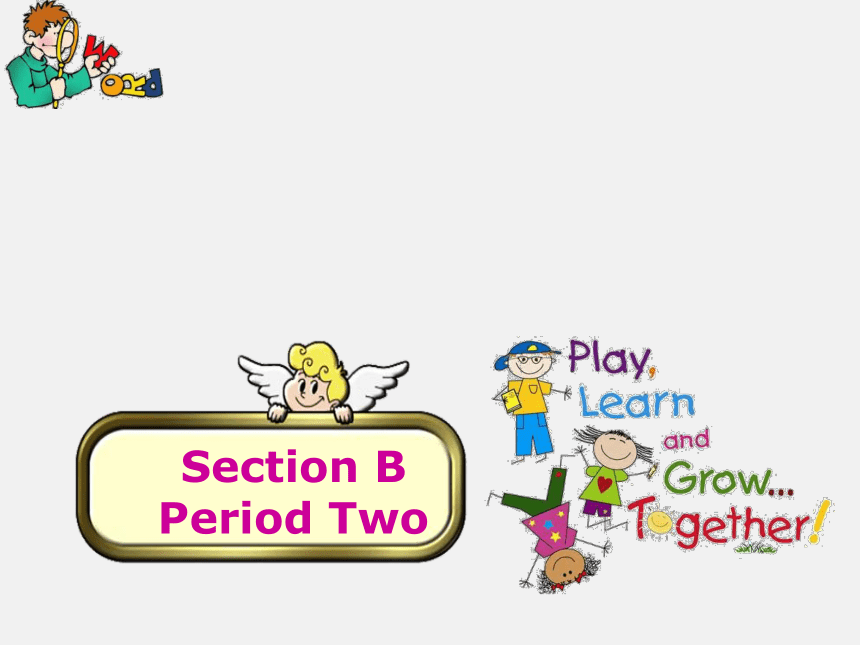 | |
| 格式 | zip | ||
| 文件大小 | 1.9MB | ||
| 资源类型 | 教案 | ||
| 版本资源 | 人教新目标(Go for it)版 | ||
| 科目 | 英语 | ||
| 更新时间 | 2021-09-01 23:12:48 | ||
图片预览

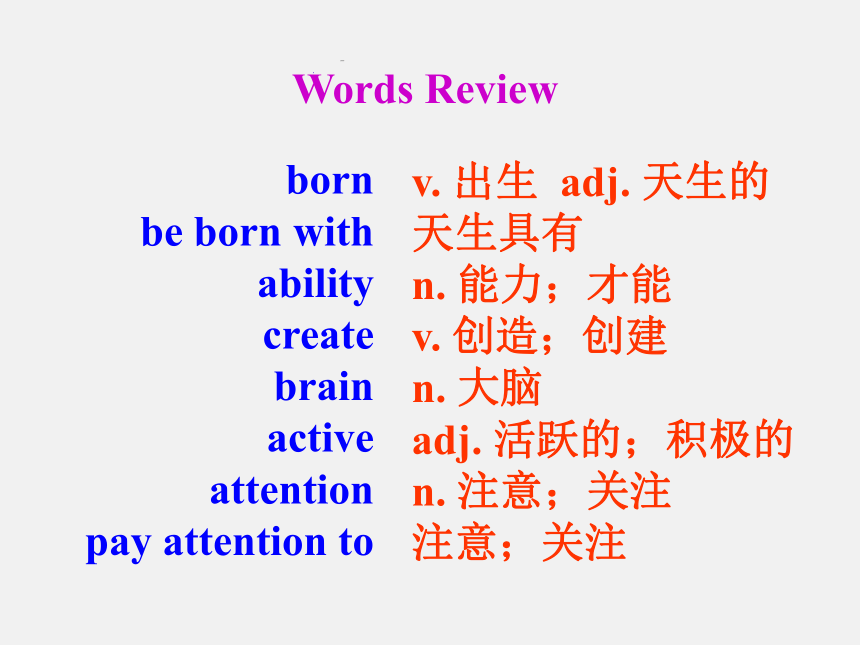
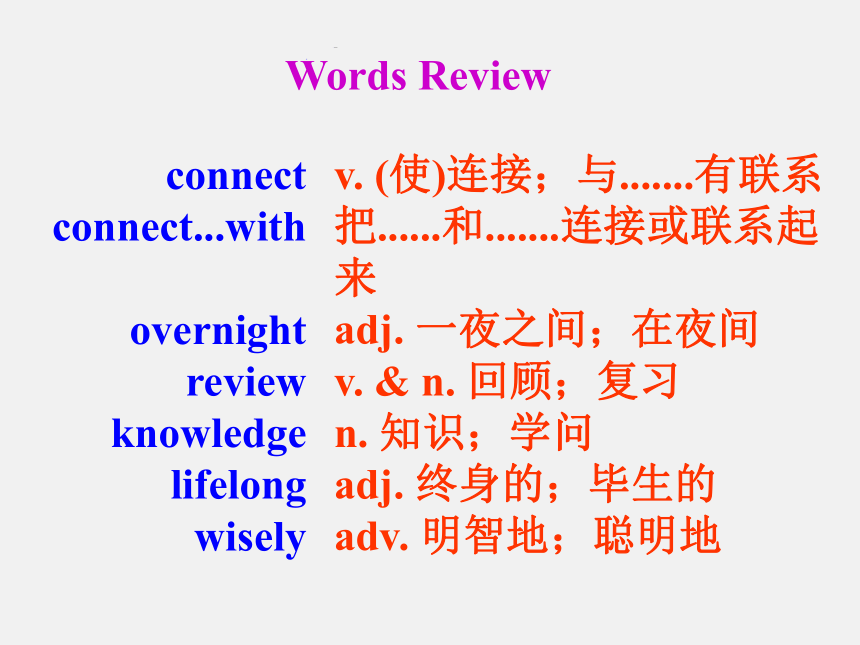
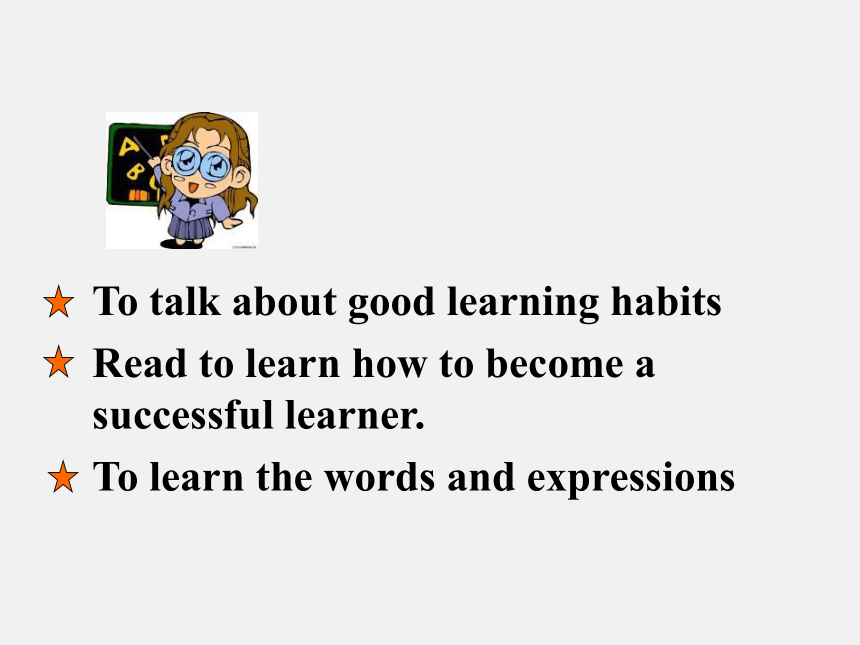
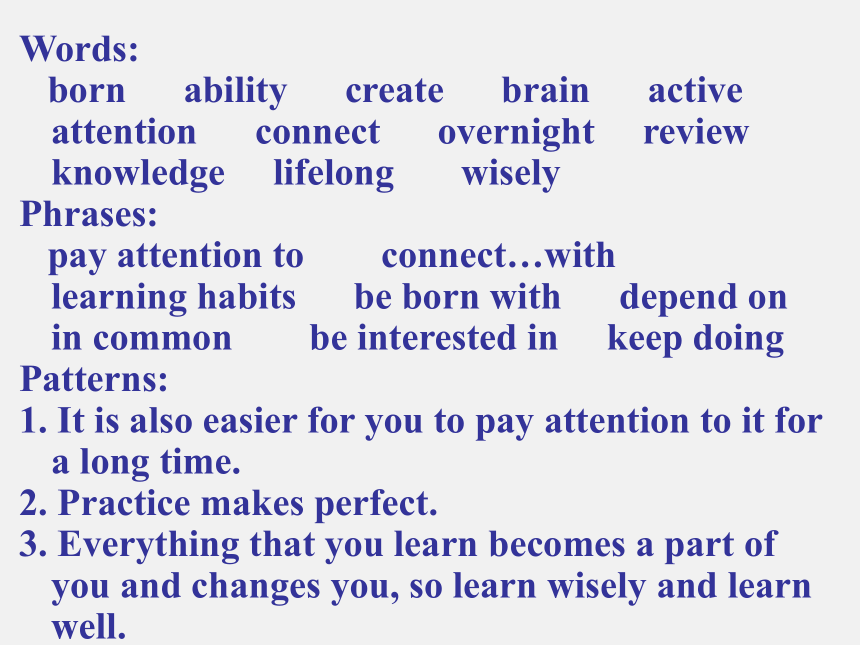
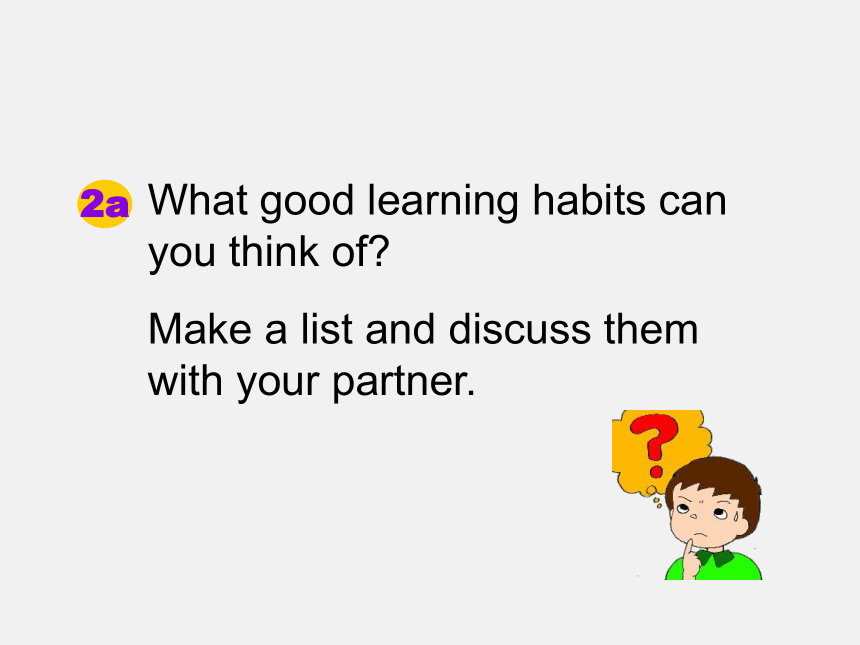
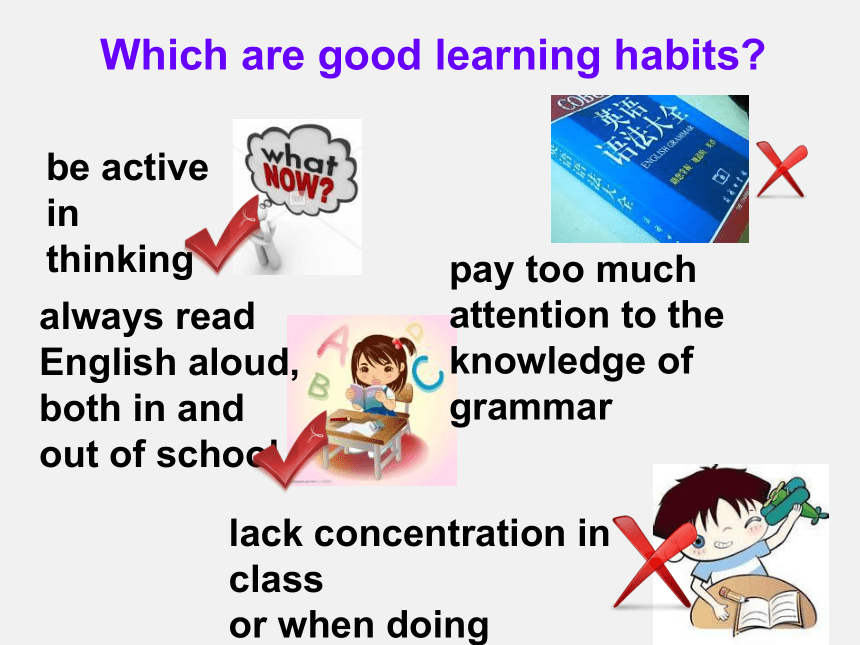
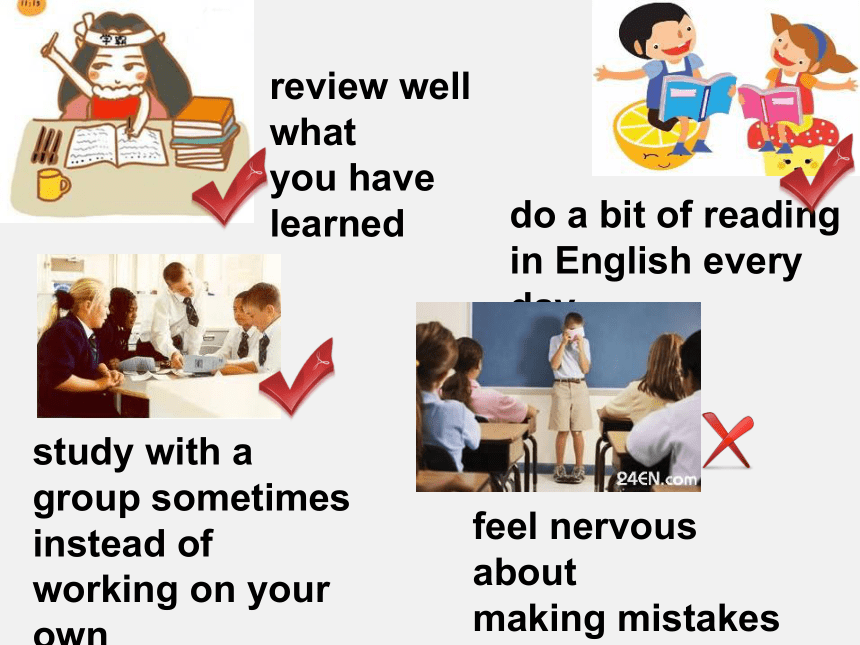
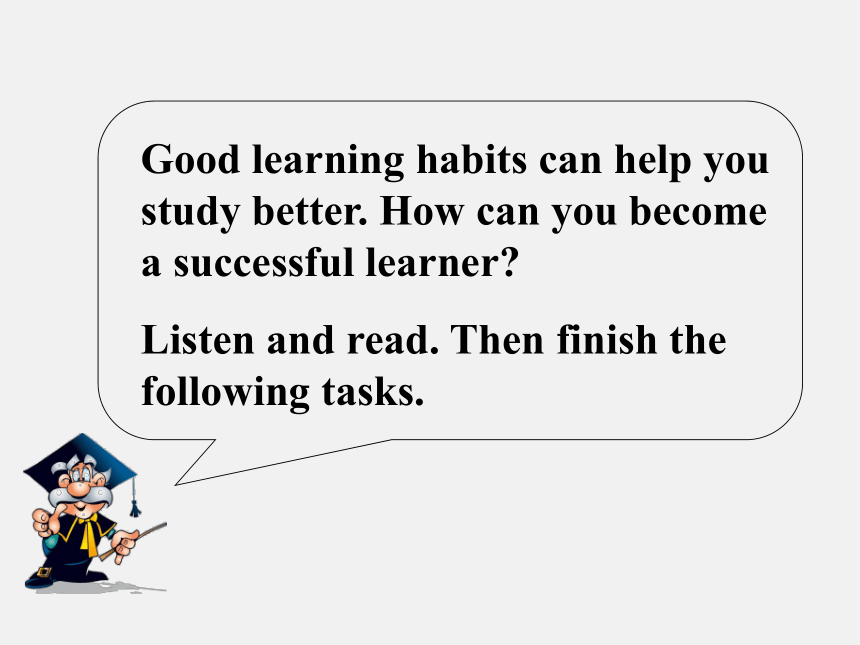
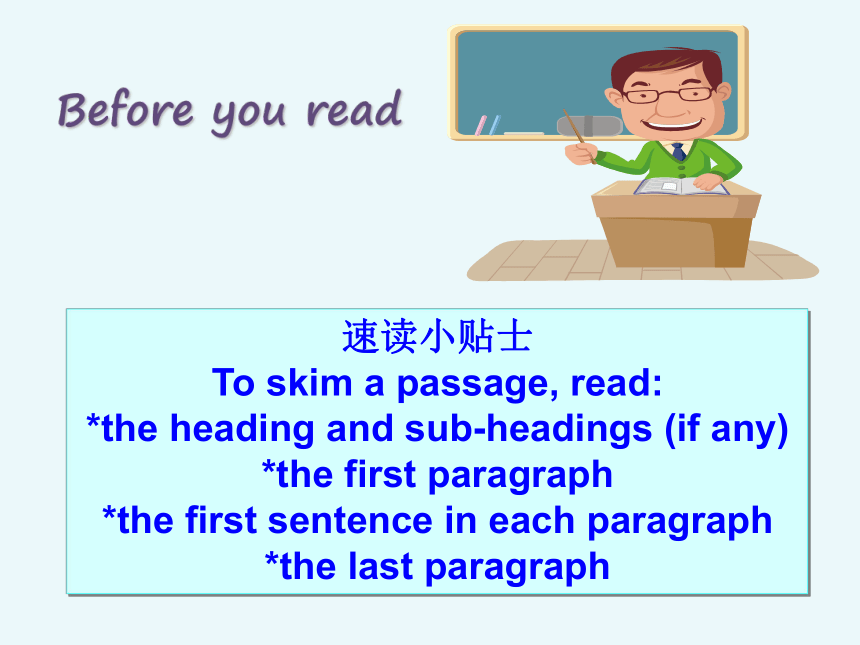
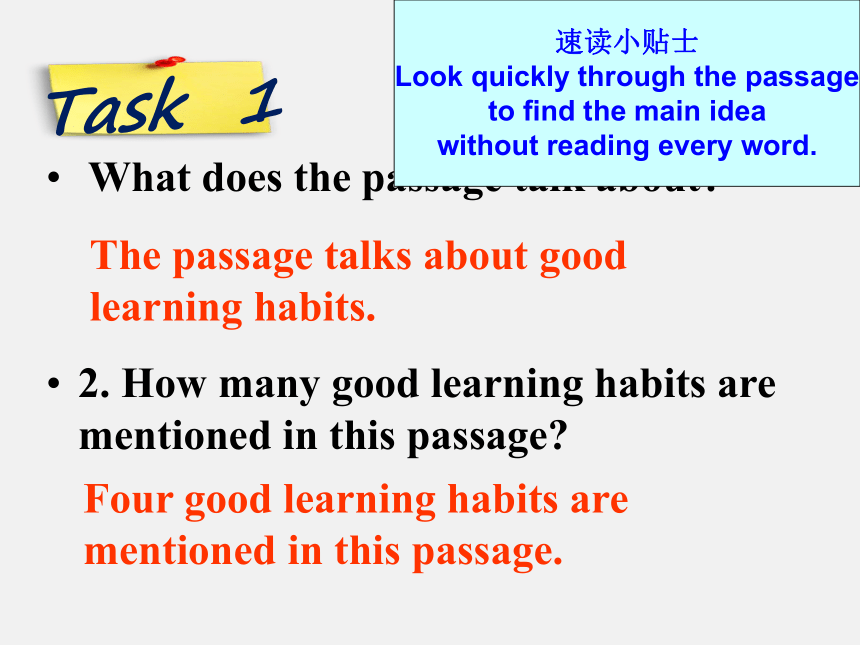
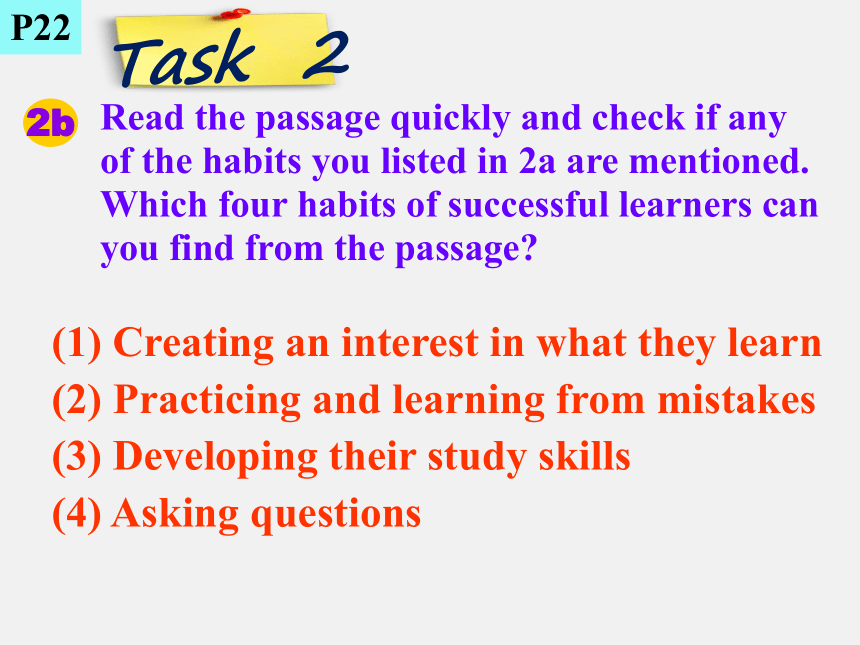
文档简介
(共37张PPT)
Unit
1
How
can
we
become
good
learners?
Section
B
Period
Two
born
be
born
with
ability
create
brain
active
attention
pay
attention
to
v.
出生
adj.
天生的
天生具有
n.
能力;才能
v.
创造;创建
n.
大脑
adj.
活跃的;积极的
n.
注意;关注
注意;关注
Words
Review
connect
connect...with
overnight
review
knowledge
lifelong
wisely
v.
(使)连接;与.......有联系
把......和.......连接或联系起来
adj.
一夜之间;在夜间
v.
&
n.
回顾;复习
n.
知识;学问
adj.
终身的;毕生的
adv.
明智地;聪明地
Words
Review
Objectives
To
talk
about
good
learning
habits
Read
to
learn
how
to
become
a
successful
learner.
To
learn
the
words
and
expressions
Words:
born
ability
create
brain
active
attention
connect
overnight
review
knowledge
lifelong
wisely
Phrases:
pay
attention
to
connect…with
learning
habits
be
born
with
depend
on
in
common
be
interested
in
keep
doing
Patterns:
1.
It
is
also
easier
for
you
to
pay
attention
to
it
for
a
long
time.
2.
Practice
makes
perfect.
3.
Everything
that
you
learn
becomes
a
part
of
you
and
changes
you,
so
learn
wisely
and
learn
well.
What
good
learning
habits
can
you
think
of?
Make
a
list
and
discuss
them
with
your
partner.
2a
Which
are
good
learning
habits?
pay
too
much
attention
to
the
knowledge
of
grammar
be
active
in
thinking
always
read
English
aloud,
both
in
and
out
of
school
lack
concentration
in
class
or
when
doing
homework
review
well
what
you
have
learned
do
a
bit
of
reading
in
English
every
day
feel
nervous
about
making
mistakes
study
with
a
group
sometimes
instead
of
working
on
your
own
Good
learning
habits
can
help
you
study
better.
How
can
you
become
a
successful
learner?
Listen
and
read.
Then
finish
the
following
tasks.
heading
sub-headings
速读小贴士
To
skim
a
passage,
read:
the
heading
and
sub-headings
(if
any)
the
first
paragraph
the
first
sentence
in
each
paragraph
the
last
paragraph
Before
you
read
What
does
the
passage
talk
about?
2.
How
many
good
learning
habits
are
mentioned
in
this
passage?
The
passage
talks
about
good
learning
habits.
Task
1
Four
good
learning
habits
are
mentioned
in
this
passage.
速读小贴士
Look
quickly
through
the
passage
to
find
the
main
idea
without
reading
every
word.
Read
the
passage
quickly
and
check
if
any
of
the
habits
you
listed
in
2a
are
mentioned.
Which
four
habits
of
successful
learners
can
you
find
from
the
passage?
2b
P22
(1)
Creating
an
interest
in
what
they
learn
(2)
Practicing
and
learning
from
mistakes
(3)
Developing
their
study
skills
(4)
Asking
questions
Task
2
Research
shows
that
successful
learners
have
some
good
habits
in
common.
Learning
is
a
lifelong
journey,
so
learn
wisely
and
learn
well.
Creating
an
interest
in
what
they
learn
Practicing
and
learning
from
mistakes
Developing
their
study
skills
Asking
questions
Learning
habits
How
can
you
become
a
successful
learner?
Title
of
the
passage
Topic
sentence
Conclusion
Task
3
Can
you
tell
the
structure
of
the
passage?
habits
supporting
details
Creating
an
interest
in
what
they
learn
Practicing
and
learning
from
mistakes
Developing
their
study
skills
Asking
questions
If
you’re
interested
in
sth.,
your
brain
is
more
active
and
it
is
also
easier
for
you
to
pay
attention
to
it
for
a
long
time.
Even
if
you
learn
sth.
well,
you
will
forget
it
unless
you
use
it.
Bell
did
not
invent
the
telephone
overnight.
He
succeeded
by
trying
many
times
and
learning
from
his
mistakes.
It’s
not
enough
to
just
study
hard.
Good
learners
know
the
best
way
they
can
study.
Good
learners
often
ask
questions
during
or
after
class.
Knowledge
comes
from
questioning.
Read
sub-headings,
the
first
sentence
and
the
last
sentence
of
each
paragraph,
then
complete
the
table.
Task
4
细读小贴士
Move
your
eyes
quickly
to
get
the
useful
information.
sub-heading
(副标题):
中心观点
the
first
sentence:
进一步具体解释说明中心观点
sub-heading
sub-heading
Creating
an
interest
in
what
they
learn
具体
说明
①
if
you
are
interested
in…
②
Good
learners
…
举例
说明
For
example,
if
they
need
to
learn
…
在句与句之间,英文结构严谨:层层递进,举例说明(总-分)。
Can
you
analyze
other
paragraphs
like
this?
habits
How
good
learners
do?
proofs
examples
Your
brain
is
more
active;
It
is
easier
for
you
to
pay
attention
to
it
for
a
long
time.
Creating
an
interest
in
what
they
learn
Good
learners
often
connect
what
they
need
to
learn
with
something
interesting.
If
they
like
music
or
sports,
they
can
listen
to
English
songs
or
watch
sports
programs
in
English.
Task
5
Fill
in
the
blanks
according
to
the
second
paragraph.
Can
you
make
charts
for
other
three
habits?
Read
the
passage
again
and
answer
the
questions.
2c
P7
Does
the
writer
think
that
everyone
is
born
with
the
ability
to
learn
well?
Do
you
agree?
Why
or
why
not?
Why
is
it
a
good
idea
to
connect
something
you
need
to
learn
with
something
you
are
interested
in?
What
do
the
sayings
“Use
it
or
lose
it”
and
“Practice
makes
perfect”
mean?
Do
you
agree
with
them?
4.
Do
good
learners
learn
from
mistakes,
or
are
they
afraid
of
making
mistakes?
5.
What
study
skills
does
the
writer
talk
about?
Do
you
have
those
study
skills?
6.
Do
you
agree
that
learning
is
a
lifelong
journey?
Why
or
why
not?
Task
6
The
writer
doesn’t
think
that
everyone
is
born
with
the
ability
to
learn
well.
I
agree
with
the
writer
that
everyone
is
born
with
the
ability
to
learn,
but
learning
well
depends
on
the
learning
habits
that
one
develops.
This
is
because
studies
show
that
if
you’re
interested
in
something,
your
brain
is
more
active
and
it
is
easier
for
you
to
pay
attention
to
it
for
a
long
time.
You
will
also
not
get
bored.
Possible
answers:
3.
Use
it
or
lose
it:
If
you
stop
doing
something,
you
will
forget
how
to
do
it.
Practice
makes
perfect:
If
you
do
something
again
and
again,
you
will
become
very
good
at
it.
4.
They
learn
from
mistakes,
and
they
are
not
afraid
of
making
mistakes.
5.
Take
notes
by
writing
down
key
words
or
by
drawing
mind
maps.
Look
for
ways
to
review
what
has
been
learnt,
e.g.
read
the
notes
every
day
or
explain
the
information
to
another
student.
Verb:
a
word
that
describes
an
action
or
a
state
(e.g.
run,
is)
Noun:
a
word
that
names
a
person,
a
place,
a
thing,
an
activity
or
a
quality
(e.g.
girl,
school,
book,
beauty)
Adjective:
a
word
that
tells
you
more
about
a
noun
(e.g.
beautiful,
small)
Adverb:
a
word
that
tells
you
more
about
a
verb,
an
adjective
or
another
adverb
(e.g.
slowly,
very)
Notes
Look
up
the
following
words
from
the
passage
in
the
dictionary.
Then
write
a
sentence
for
each
word.
2d
P7
brain
n.
connect
v.
overnight
adv.
attention
n.
review
v.
knowledge
n.
ability
n.
active
adj.
wisely
adv.
brain:
A
good
way
to
train
the
brain
is
to
do
some
math
exercises
every
day.
Task
7
Possible
answers:
The
brain
is
one
of
the
most
important
parts
of
the
body.
Draw
a
line
to
connect
these
two
points.
Don’t
expect
to
learn
a
new
skill
overnight.
It
is
important
to
pay
attention
in
class.
At
the
end
of
every
day,
I
try
to
review
the
new
words
I
learned
that
day.
Learning
a
new
language
also
helps
us
to
gain
some
knowledge
of
the
culture
of
its
native
speakers.
Scientists
believe
that
only
humans
have
the
ability
to
learn
a
complex
language.
My
brother
is
active
and
enjoys
sports.
Her
mother
wisely
advised
her
not
to
give
up
studying
English.
Do
you
think
you
are
a
good
learner?
What
learning
habits
do
you
think
are
useful?
Discuss
with
your
group
and
share
your
ideas
with
the
class.
2e
P7
Discuss
Task
8
Some
sentence
starters
for
giving
opinions:
I
think…
I
feel…
I
believe…
It
is
important
to…
How
to
give
my
opinion?
1.
But
whether
or
not
you
can
do
this
well
depends
on
your
learning
habits.
(1)
whether
or
not
you
can
do
this
well是一个从句,作整个句子的主语。这种从句叫做“主语从句”
Whether
you
did
it
right
or
wrong
isn’t
so
important.
What’s
important
is
the
experience
you
gained.
你做对做错都不重要,重要的是你从中获得了经验。
Language
points
(2)
Whether
or
not:
英语从句中的一个连词结构,意思和功能相当于whether,表示“是否”。
常出现在宾语从句、主语从句中
使用时也可以把whether和or
not分开,or
not
放到句尾
I
can’t
tell
whether
or
not
the
teacher
likes
me.
我不知道老师喜不喜欢我。
=
I
can’t
tell
whether
the
teacher
likes
me
or
not.
(3)
depend
on/
upon
依据;依赖
depend
on
sb./
sth.
to
do
sth.
We
depend
entirely
on
donations
from
the
public.
我们完全依赖公众的捐助。
I’m
depending
on
you
to
get
this
done.
我指望着你把这件事给办了。
2.
Research
shows
that
successful
learners
have
some
good
habits
in
common.
have
sth.
in
common
(with
sb./
sth.)
(与某人、某物有相同之处)
Their
methods
have
a
lot
in
common.
他们的方法有很多相同之处。
3.
Studies
show
that
if
you
are
interested
in
something,
your
brain
is
more
active
and
it
is
also
easier
for
you
to
pay
attention
to
it
for
a
long
time.
be
interested
in
sth./
doing
sth.
对……很感兴趣
(1)
–ed:修饰人,描述人的声音、表情或感受
(2)
–ing:修饰事物,描述事物的状态或性质
I’m
not
really
interested
in
politics.
我对政治不是很感兴趣。
类似的还有:
interested
感兴趣的
interesting
令人感兴趣的
disappointed
失望的
disappointing
令人失望的
bored
感到无聊的
boring
无聊的
excited
兴奋的
exciting
令人兴奋的
pay
attention
to
注意;专心;留心
pay
no
attention
to
对……不在意
The
TV
was
on
but
Di
wasn’t
paying
much
attention
to
it.
电视开着,可是戴没怎么注意看。
You
should
pay
no
attention
to
his
stupid
words.
别太在意他的蠢话。
4.
Even
if
you
learn
something
well,
you
will
forget
it
unless
you
use
it.
unless
连词,“
除非,如果不”
,引导条件状语从句,含有否定意义,相当于if
…
not
。
I
shall
go
to
the
supermarket
unless
it
rains.
=
I
shall
go
to
the
supermarket
if
it
doesn’t
rain.
Review
Phrases:
depend
on/
upon;
unless
;
have
sth.
in
common
(with
sb./
sth.);
be
interested
in
sth./
doing
sth.
;
pay
attention
to
Four
habits
of
successful
learners:
(1)
Creating
an
interest
in
what
they
learn
(2)
Practicing
and
learning
from
mistakes
(3)
Developing
their
study
skills
(4)
Asking
questions
根据句意及汉语提示完成句子。
Han
Mei
is
_______
(活跃)
in
every
class.
Everyone
is
_______
(天生)
with
the
_______
(能力)
to
learn.
You
should
pay
________
(注意)
to
your
pronunciation.
Internet
can
________
(使……连接)
us
with
the
world.
_________
(知识)comes
from
questioning.
active
born
ability
attention
connect
Knowledge
QUIZ
Translate
and
write
them
down.
令我吃惊的是,我发现自己和这个陌生人之间有很多共同之处。
2.
天气若不很冷,我总是开着窗户睡觉。
To
my
surprise,
I
found
I
had
a
lot
in
common
with
this
stranger.
I
sleep
with
the
window
open
unless
it’s
really
cold.
3.
你能依靠她来应付(deal
with)这种局面。
4.
请注意你的字迹。
5.
他对小说(fiction)感兴趣。
You
can
depend
upon
her
to
deal
with
this
situation.
Please
pay
attention
to
your
handwriting.
He
is
interested
in
fictions.
1.
Review
the
words
and
expressions
we’ve
learned
today.
2.
Read
the
articles
in
Learning
English.
3.
Finish
the
exercises
in
Learning
English.
4.
Preview
3a-3b
on
P7-8.
Homework
Unit
1
How
can
we
become
good
learners?
Section
B
Period
Two
born
be
born
with
ability
create
brain
active
attention
pay
attention
to
v.
出生
adj.
天生的
天生具有
n.
能力;才能
v.
创造;创建
n.
大脑
adj.
活跃的;积极的
n.
注意;关注
注意;关注
Words
Review
connect
connect...with
overnight
review
knowledge
lifelong
wisely
v.
(使)连接;与.......有联系
把......和.......连接或联系起来
adj.
一夜之间;在夜间
v.
&
n.
回顾;复习
n.
知识;学问
adj.
终身的;毕生的
adv.
明智地;聪明地
Words
Review
Objectives
To
talk
about
good
learning
habits
Read
to
learn
how
to
become
a
successful
learner.
To
learn
the
words
and
expressions
Words:
born
ability
create
brain
active
attention
connect
overnight
review
knowledge
lifelong
wisely
Phrases:
pay
attention
to
connect…with
learning
habits
be
born
with
depend
on
in
common
be
interested
in
keep
doing
Patterns:
1.
It
is
also
easier
for
you
to
pay
attention
to
it
for
a
long
time.
2.
Practice
makes
perfect.
3.
Everything
that
you
learn
becomes
a
part
of
you
and
changes
you,
so
learn
wisely
and
learn
well.
What
good
learning
habits
can
you
think
of?
Make
a
list
and
discuss
them
with
your
partner.
2a
Which
are
good
learning
habits?
pay
too
much
attention
to
the
knowledge
of
grammar
be
active
in
thinking
always
read
English
aloud,
both
in
and
out
of
school
lack
concentration
in
class
or
when
doing
homework
review
well
what
you
have
learned
do
a
bit
of
reading
in
English
every
day
feel
nervous
about
making
mistakes
study
with
a
group
sometimes
instead
of
working
on
your
own
Good
learning
habits
can
help
you
study
better.
How
can
you
become
a
successful
learner?
Listen
and
read.
Then
finish
the
following
tasks.
heading
sub-headings
速读小贴士
To
skim
a
passage,
read:
the
heading
and
sub-headings
(if
any)
the
first
paragraph
the
first
sentence
in
each
paragraph
the
last
paragraph
Before
you
read
What
does
the
passage
talk
about?
2.
How
many
good
learning
habits
are
mentioned
in
this
passage?
The
passage
talks
about
good
learning
habits.
Task
1
Four
good
learning
habits
are
mentioned
in
this
passage.
速读小贴士
Look
quickly
through
the
passage
to
find
the
main
idea
without
reading
every
word.
Read
the
passage
quickly
and
check
if
any
of
the
habits
you
listed
in
2a
are
mentioned.
Which
four
habits
of
successful
learners
can
you
find
from
the
passage?
2b
P22
(1)
Creating
an
interest
in
what
they
learn
(2)
Practicing
and
learning
from
mistakes
(3)
Developing
their
study
skills
(4)
Asking
questions
Task
2
Research
shows
that
successful
learners
have
some
good
habits
in
common.
Learning
is
a
lifelong
journey,
so
learn
wisely
and
learn
well.
Creating
an
interest
in
what
they
learn
Practicing
and
learning
from
mistakes
Developing
their
study
skills
Asking
questions
Learning
habits
How
can
you
become
a
successful
learner?
Title
of
the
passage
Topic
sentence
Conclusion
Task
3
Can
you
tell
the
structure
of
the
passage?
habits
supporting
details
Creating
an
interest
in
what
they
learn
Practicing
and
learning
from
mistakes
Developing
their
study
skills
Asking
questions
If
you’re
interested
in
sth.,
your
brain
is
more
active
and
it
is
also
easier
for
you
to
pay
attention
to
it
for
a
long
time.
Even
if
you
learn
sth.
well,
you
will
forget
it
unless
you
use
it.
Bell
did
not
invent
the
telephone
overnight.
He
succeeded
by
trying
many
times
and
learning
from
his
mistakes.
It’s
not
enough
to
just
study
hard.
Good
learners
know
the
best
way
they
can
study.
Good
learners
often
ask
questions
during
or
after
class.
Knowledge
comes
from
questioning.
Read
sub-headings,
the
first
sentence
and
the
last
sentence
of
each
paragraph,
then
complete
the
table.
Task
4
细读小贴士
Move
your
eyes
quickly
to
get
the
useful
information.
sub-heading
(副标题):
中心观点
the
first
sentence:
进一步具体解释说明中心观点
sub-heading
sub-heading
Creating
an
interest
in
what
they
learn
具体
说明
①
if
you
are
interested
in…
②
Good
learners
…
举例
说明
For
example,
if
they
need
to
learn
…
在句与句之间,英文结构严谨:层层递进,举例说明(总-分)。
Can
you
analyze
other
paragraphs
like
this?
habits
How
good
learners
do?
proofs
examples
Your
brain
is
more
active;
It
is
easier
for
you
to
pay
attention
to
it
for
a
long
time.
Creating
an
interest
in
what
they
learn
Good
learners
often
connect
what
they
need
to
learn
with
something
interesting.
If
they
like
music
or
sports,
they
can
listen
to
English
songs
or
watch
sports
programs
in
English.
Task
5
Fill
in
the
blanks
according
to
the
second
paragraph.
Can
you
make
charts
for
other
three
habits?
Read
the
passage
again
and
answer
the
questions.
2c
P7
Does
the
writer
think
that
everyone
is
born
with
the
ability
to
learn
well?
Do
you
agree?
Why
or
why
not?
Why
is
it
a
good
idea
to
connect
something
you
need
to
learn
with
something
you
are
interested
in?
What
do
the
sayings
“Use
it
or
lose
it”
and
“Practice
makes
perfect”
mean?
Do
you
agree
with
them?
4.
Do
good
learners
learn
from
mistakes,
or
are
they
afraid
of
making
mistakes?
5.
What
study
skills
does
the
writer
talk
about?
Do
you
have
those
study
skills?
6.
Do
you
agree
that
learning
is
a
lifelong
journey?
Why
or
why
not?
Task
6
The
writer
doesn’t
think
that
everyone
is
born
with
the
ability
to
learn
well.
I
agree
with
the
writer
that
everyone
is
born
with
the
ability
to
learn,
but
learning
well
depends
on
the
learning
habits
that
one
develops.
This
is
because
studies
show
that
if
you’re
interested
in
something,
your
brain
is
more
active
and
it
is
easier
for
you
to
pay
attention
to
it
for
a
long
time.
You
will
also
not
get
bored.
Possible
answers:
3.
Use
it
or
lose
it:
If
you
stop
doing
something,
you
will
forget
how
to
do
it.
Practice
makes
perfect:
If
you
do
something
again
and
again,
you
will
become
very
good
at
it.
4.
They
learn
from
mistakes,
and
they
are
not
afraid
of
making
mistakes.
5.
Take
notes
by
writing
down
key
words
or
by
drawing
mind
maps.
Look
for
ways
to
review
what
has
been
learnt,
e.g.
read
the
notes
every
day
or
explain
the
information
to
another
student.
Verb:
a
word
that
describes
an
action
or
a
state
(e.g.
run,
is)
Noun:
a
word
that
names
a
person,
a
place,
a
thing,
an
activity
or
a
quality
(e.g.
girl,
school,
book,
beauty)
Adjective:
a
word
that
tells
you
more
about
a
noun
(e.g.
beautiful,
small)
Adverb:
a
word
that
tells
you
more
about
a
verb,
an
adjective
or
another
adverb
(e.g.
slowly,
very)
Notes
Look
up
the
following
words
from
the
passage
in
the
dictionary.
Then
write
a
sentence
for
each
word.
2d
P7
brain
n.
connect
v.
overnight
adv.
attention
n.
review
v.
knowledge
n.
ability
n.
active
adj.
wisely
adv.
brain:
A
good
way
to
train
the
brain
is
to
do
some
math
exercises
every
day.
Task
7
Possible
answers:
The
brain
is
one
of
the
most
important
parts
of
the
body.
Draw
a
line
to
connect
these
two
points.
Don’t
expect
to
learn
a
new
skill
overnight.
It
is
important
to
pay
attention
in
class.
At
the
end
of
every
day,
I
try
to
review
the
new
words
I
learned
that
day.
Learning
a
new
language
also
helps
us
to
gain
some
knowledge
of
the
culture
of
its
native
speakers.
Scientists
believe
that
only
humans
have
the
ability
to
learn
a
complex
language.
My
brother
is
active
and
enjoys
sports.
Her
mother
wisely
advised
her
not
to
give
up
studying
English.
Do
you
think
you
are
a
good
learner?
What
learning
habits
do
you
think
are
useful?
Discuss
with
your
group
and
share
your
ideas
with
the
class.
2e
P7
Discuss
Task
8
Some
sentence
starters
for
giving
opinions:
I
think…
I
feel…
I
believe…
It
is
important
to…
How
to
give
my
opinion?
1.
But
whether
or
not
you
can
do
this
well
depends
on
your
learning
habits.
(1)
whether
or
not
you
can
do
this
well是一个从句,作整个句子的主语。这种从句叫做“主语从句”
Whether
you
did
it
right
or
wrong
isn’t
so
important.
What’s
important
is
the
experience
you
gained.
你做对做错都不重要,重要的是你从中获得了经验。
Language
points
(2)
Whether
or
not:
英语从句中的一个连词结构,意思和功能相当于whether,表示“是否”。
常出现在宾语从句、主语从句中
使用时也可以把whether和or
not分开,or
not
放到句尾
I
can’t
tell
whether
or
not
the
teacher
likes
me.
我不知道老师喜不喜欢我。
=
I
can’t
tell
whether
the
teacher
likes
me
or
not.
(3)
depend
on/
upon
依据;依赖
depend
on
sb./
sth.
to
do
sth.
We
depend
entirely
on
donations
from
the
public.
我们完全依赖公众的捐助。
I’m
depending
on
you
to
get
this
done.
我指望着你把这件事给办了。
2.
Research
shows
that
successful
learners
have
some
good
habits
in
common.
have
sth.
in
common
(with
sb./
sth.)
(与某人、某物有相同之处)
Their
methods
have
a
lot
in
common.
他们的方法有很多相同之处。
3.
Studies
show
that
if
you
are
interested
in
something,
your
brain
is
more
active
and
it
is
also
easier
for
you
to
pay
attention
to
it
for
a
long
time.
be
interested
in
sth./
doing
sth.
对……很感兴趣
(1)
–ed:修饰人,描述人的声音、表情或感受
(2)
–ing:修饰事物,描述事物的状态或性质
I’m
not
really
interested
in
politics.
我对政治不是很感兴趣。
类似的还有:
interested
感兴趣的
interesting
令人感兴趣的
disappointed
失望的
disappointing
令人失望的
bored
感到无聊的
boring
无聊的
excited
兴奋的
exciting
令人兴奋的
pay
attention
to
注意;专心;留心
pay
no
attention
to
对……不在意
The
TV
was
on
but
Di
wasn’t
paying
much
attention
to
it.
电视开着,可是戴没怎么注意看。
You
should
pay
no
attention
to
his
stupid
words.
别太在意他的蠢话。
4.
Even
if
you
learn
something
well,
you
will
forget
it
unless
you
use
it.
unless
连词,“
除非,如果不”
,引导条件状语从句,含有否定意义,相当于if
…
not
。
I
shall
go
to
the
supermarket
unless
it
rains.
=
I
shall
go
to
the
supermarket
if
it
doesn’t
rain.
Review
Phrases:
depend
on/
upon;
unless
;
have
sth.
in
common
(with
sb./
sth.);
be
interested
in
sth./
doing
sth.
;
pay
attention
to
Four
habits
of
successful
learners:
(1)
Creating
an
interest
in
what
they
learn
(2)
Practicing
and
learning
from
mistakes
(3)
Developing
their
study
skills
(4)
Asking
questions
根据句意及汉语提示完成句子。
Han
Mei
is
_______
(活跃)
in
every
class.
Everyone
is
_______
(天生)
with
the
_______
(能力)
to
learn.
You
should
pay
________
(注意)
to
your
pronunciation.
Internet
can
________
(使……连接)
us
with
the
world.
_________
(知识)comes
from
questioning.
active
born
ability
attention
connect
Knowledge
QUIZ
Translate
and
write
them
down.
令我吃惊的是,我发现自己和这个陌生人之间有很多共同之处。
2.
天气若不很冷,我总是开着窗户睡觉。
To
my
surprise,
I
found
I
had
a
lot
in
common
with
this
stranger.
I
sleep
with
the
window
open
unless
it’s
really
cold.
3.
你能依靠她来应付(deal
with)这种局面。
4.
请注意你的字迹。
5.
他对小说(fiction)感兴趣。
You
can
depend
upon
her
to
deal
with
this
situation.
Please
pay
attention
to
your
handwriting.
He
is
interested
in
fictions.
1.
Review
the
words
and
expressions
we’ve
learned
today.
2.
Read
the
articles
in
Learning
English.
3.
Finish
the
exercises
in
Learning
English.
4.
Preview
3a-3b
on
P7-8.
Homework
同课章节目录
- Unit 1 How can we become good learners.
- Section A
- Section B
- Unit 2 I think that mooncakes are delicious!
- Section A
- Section B
- Unit 3 Could you please tell me where the restroom
- Section A
- Section B
- Unit 4 I used to be afraid of the dark.
- Section A
- Section B
- Unit 5 What are the shirts made of?
- Section A
- Section B
- Review of Units 1-5
- Unit 6 When was it invented?
- Section A
- Section B
- Unit 7 Teenagers should be allowed to choose their
- Section A
- Section B
- Unit 8 It must belong to Carla.
- Section A
- Section B
- Unit 9 I like music that I can dance to.
- Section A
- Section B
- Unit 10 You're supposed to shake hands.
- Section A
- Section B
- Review of Units 6-10
- Unit 11 Sad movies make me cry.
- Section A
- Section B
- Unit 12 Life is full of the unexpected
- Section A
- Section B
- Unit 13 We're trying to save the earth!
- Section A
- Section B
- Unit 14 I remember meeting all of you in Grade 7.
- Section A
- Section B
- Review of Units 11-14
